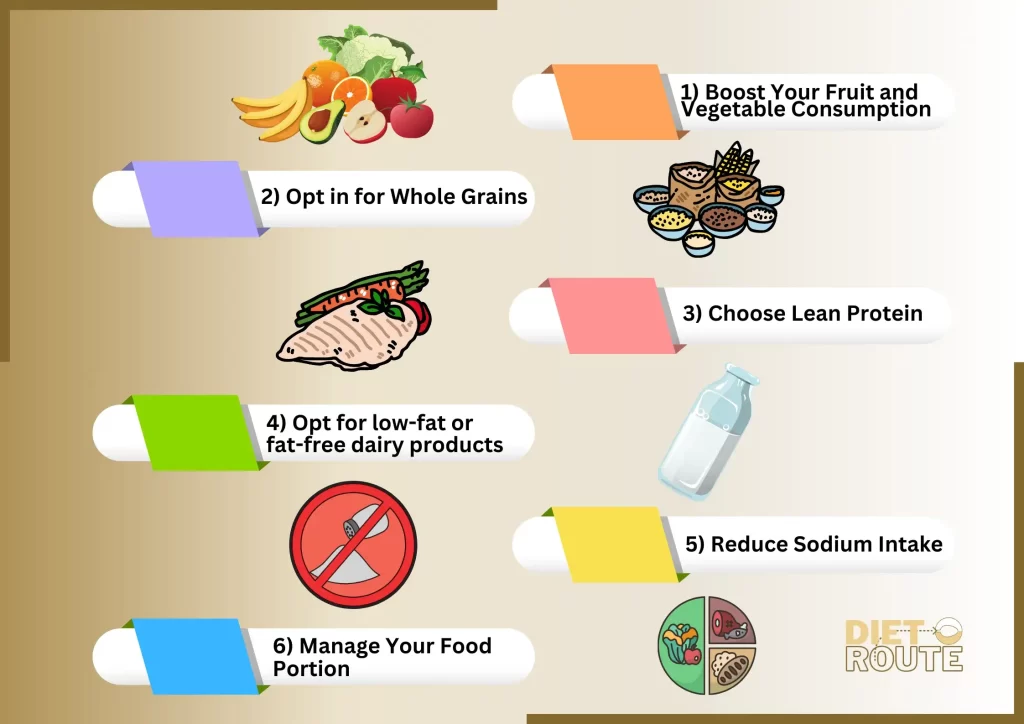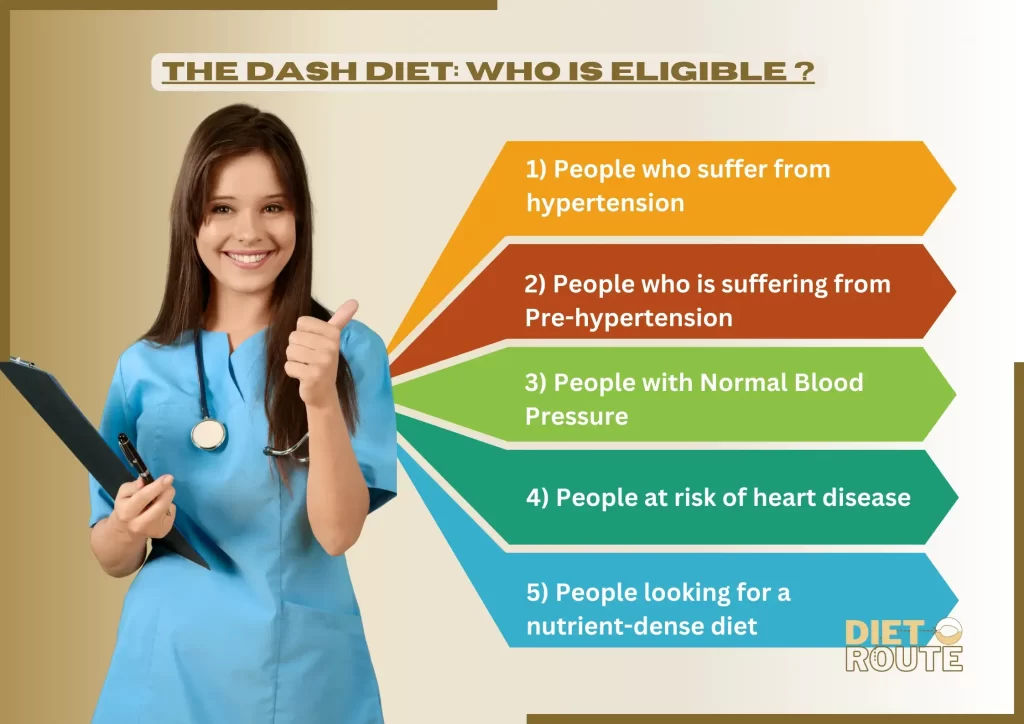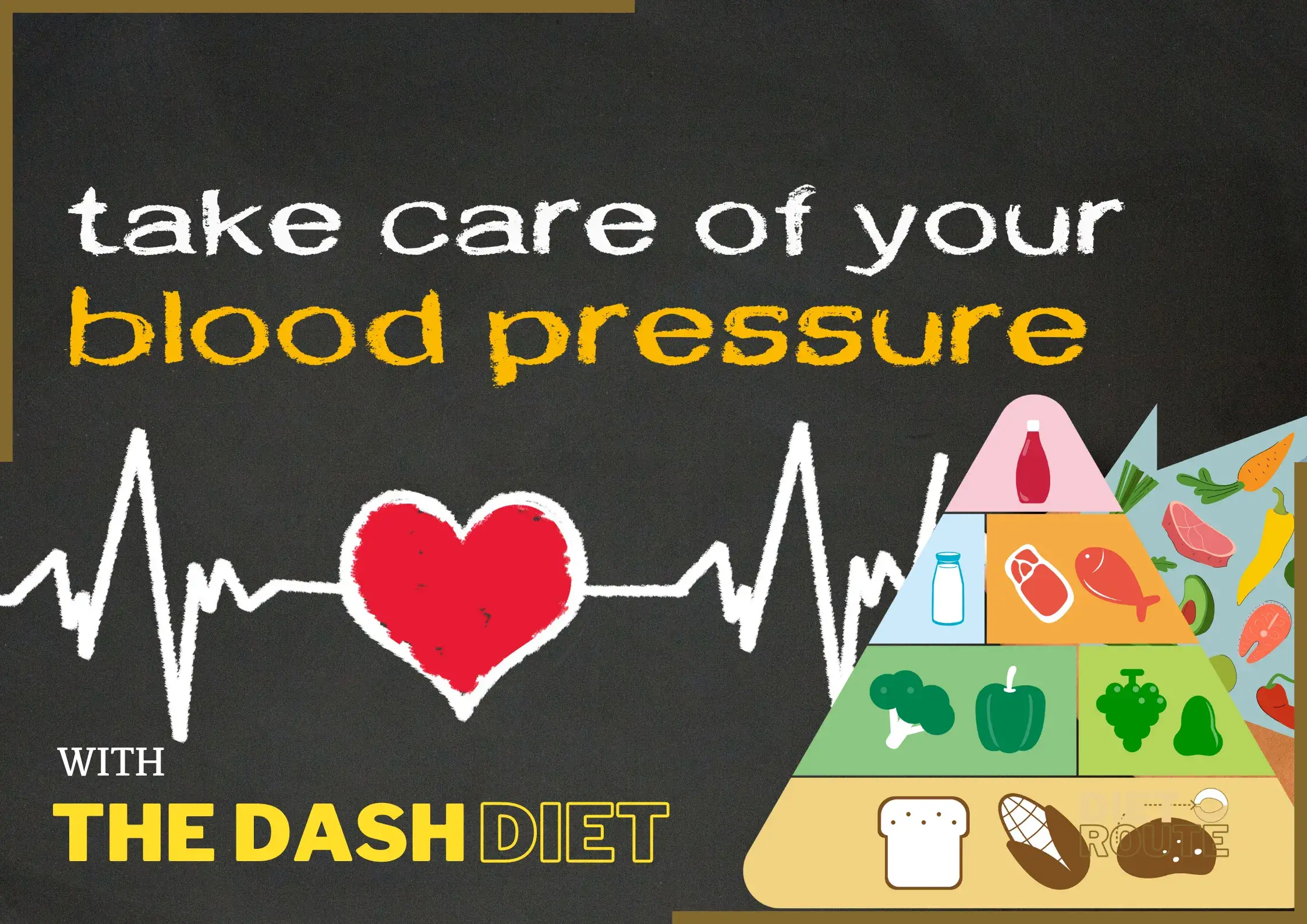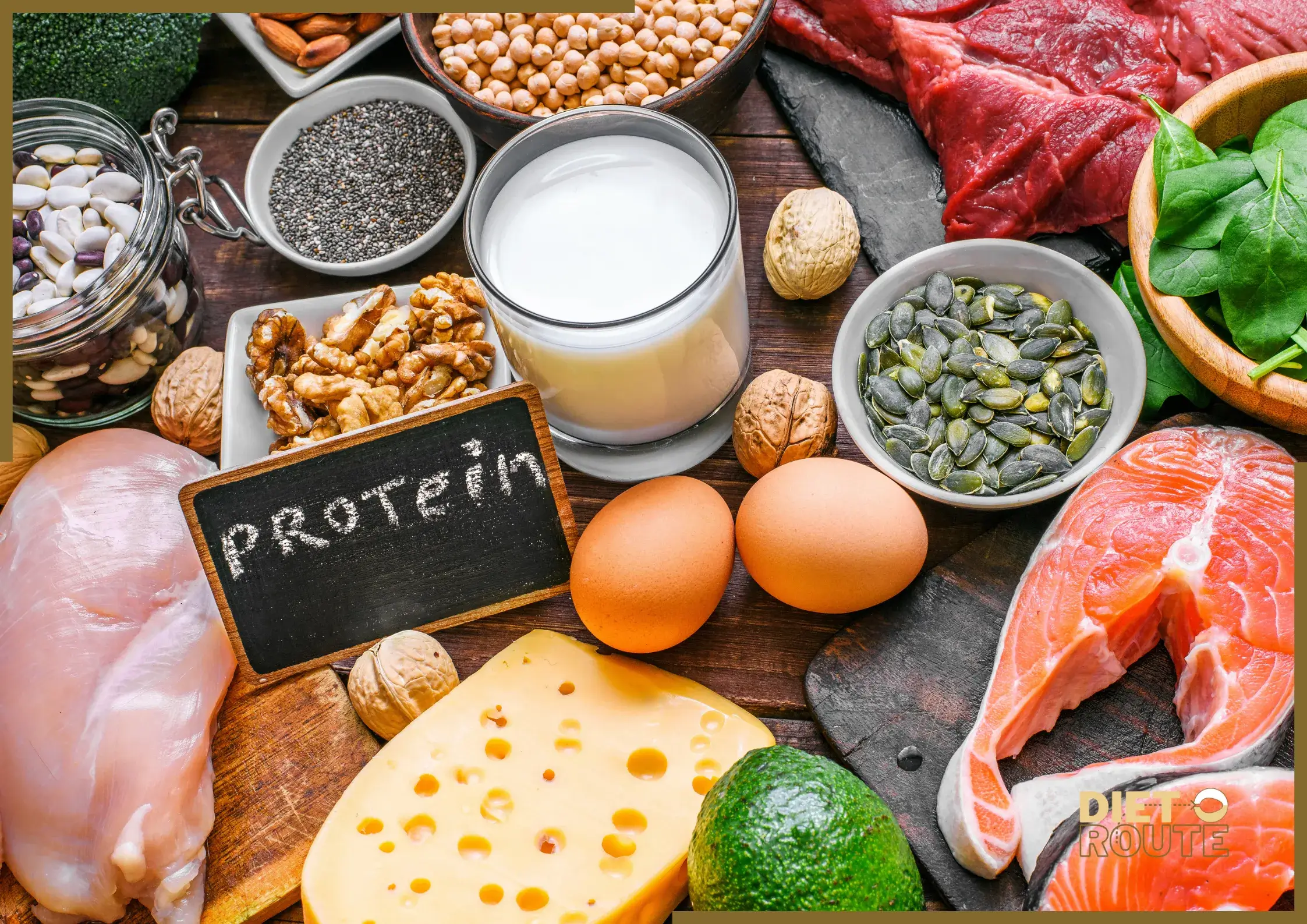“Power up your body with the nutrient-dense foods recommended by the DASH diet. If you do this, your body will reward you with more vigor and stamina.” – Diet Route
Table of Contents
Introduction
This blog post delves into the DASH (Dietary Approaches to Stop Hypertension) diet and its crucial role in reducing blood pressure through dietary choices. Managing high blood pressure can be made easier with the right dietary choices. It is a prevalent health issue that can be effectively addressed through proper nutrition. Explore the essential principles and advantages of the DASH diet for optimal health.
The DASH diet focuses on incorporating nutrient-dense foods that have low levels of saturated fat, cholesterol, and sodium. This diet promotes a well-rounded consumption of fruits, vegetables, whole grains, lean proteins, and low-fat dairy items. This food pairing offers vital nutrients and helps lower the risk of hypertension
Development of DASH diet
The DASH (Dietary Approaches to Stop Hypertension) diet was not created by a sole individual. The development of this was made possible by research funded by the National Heart, Lung, and Blood Institute (NHLBI), which is a part of the U.S. The National Institutes of Health. In the 1990s, the NHLBI conducted studies to examine the impact of diet on blood pressure.
The creation of the DASH eating plan was based on research studies that sought to identify dietary patterns capable of effectively reducing blood pressure. The study analyzed and contrasted various dietary methods and their effects on blood pressure.
The DASH diet is a proven method for lowering blood pressure through dietary changes. The diet plan highlights the importance of incorporating fruits, vegetables, whole grains, lean proteins, and low-fat dairy products into your meals, while also restricting your sodium intake.
Although the DASH diet was created by a group of researchers and specialists, it’s worth noting that the individual contributors to the development and research of the DASH diet are not commonly recognized as its creators. This dietary approach is widely acknowledged as a scientifically supported method to regulate blood pressure and enhance cardiovascular well-being.
Benefits
1)The DASH diet has been found to effectively reduce blood pressure levels, particularly in people with hypertension, according to research studies.
2) The DASH diet is beneficial for heart health as it encourages the intake of heart-healthy nutrients like potassium, magnesium, and fiber, which can help reduce the risk of cardiovascular diseases.
3) The DASH diet is beneficial for weight management as it promotes portion control and the intake of nutrient-rich foods, which can aid in weight loss or weight maintenance.
4) The DASH diet is beneficial for reducing fluid retention and cardiovascular strain by limiting sodium intake.
How to Implement the DASH Diet for Better Health? 6 Tips to Stop Hypertension

1) Boost Your Fruit and Vegetable Consumption:
Integrate a diverse range of vibrant fruits and vegetables into your everyday meals and snacks. These offer vital vitamins, nutrients, minerals, and antioxidants that are essential for optimal health and aid in reducing blood pressure.
2) Opt in for Whole Grains:
Swap out refined grains for nutrient-rich whole grains such as brown rice, whole wheat bread, and oats. Fiber-rich foods are beneficial for maintaining a healthy heart. These foods are rich in fiber, promoting healthy blood pressure and supporting cardiovascular wellness.
3) Choose Lean Proteins:
Incorporate lean protein sources like skinless chicken, fish, legumes, and tofu into your diet. These foods are rich in essential amino acids and low in saturated fat.
4) Opt for low-fat or fat-free dairy products:
Opt for low-fat or fat-free dairy products such as skim milk, yogurt, and cheese to maintain moderate dairy consumption. Calcium and protein can be obtained from these excellent sources.
5) Reduce Sodium Intake:
Minimize consumption of processed foods and refrain from adding excess salt to your meals. Substitute herbs, spices, and other flavorings in place of other ingredients.
6) Manage Your Food Portions for a Healthier Lifestyle:
The DASH diet emphasizes the importance of controlling portions for optimal results. Being mindful of the amount of food you eat can aid in controlling calorie intake and promoting a healthy weigh
By following these guidelines, people can effectively reduce their blood pressure and enhance their overall well-being. Consultation with a healthcare professional is crucial when following the DASH diet, particularly for those with specific dietary requirements or medical conditions.
Eligibility

The DASH (Dietary Approaches to Stop Hypertension) diet is a great option for those looking to enhance their overall health and effectively regulate or decrease their blood pressure. It is appropriate for a diverse range of individuals. This is especially advantageous for:
1) People who suffer from hypertension (high blood pressure):
The effectiveness of the DASH diet in reducing blood pressure levels has been scientifically proven, making it a suitable option for people with hypertension. By adhering to the DASH principles, individuals can effectively regulate their blood pressure and minimize the likelihood of associated complications.
2) Pre-hypertension in Individuals:
Prehypertension is a medical condition characterized by blood pressure levels that exceed the normal range but are not yet considered as hypertension. The DASH diet is an effective way to prevent hypertension and maintain healthy blood pressure levels for individuals in this category.
3) People with Normal Blood Pressure:
The DASH diet can improve heart health and lower the risk of cardiovascular diseases, even if your blood pressure is normal. This approach to nutrition promotes balance and encourages the intake of foods that are rich in nutrients.
4) Reducing the Risk of Cardiovascular Diseases for Individuals:
The DASH diet is ideal for people at risk of heart disease, including those with a family history of cardiovascular problems or those with unhealthy lifestyle habits. Improving heart health can be achieved by adopting the DASH principles and taking proactive measures.
5) People looking for a well-balanced and nutrient-dense diet:
The DASH diet is an excellent option for those seeking to embrace a healthy lifestyle, as it encourages a balanced and nourishing dietary regimen. This diet plan prioritizes the consumption of whole foods, lean proteins, low-fat dairy products, fruits, and vegetables to ensure the intake of vital nutrients for optimal health.
Before starting the DASH diet, it is recommended to seek advice from a healthcare professional or registered dietitian, particularly if you have any underlying health conditions or specific dietary requirements. Our experts can offer customized advice to ensure that your diet plan meets your unique needs.
Is it safe for a woman who is pregnant?

The DASH (Dietary Approaches to Stop Hypertension) diet is a safe option for pregnant women. However, it is recommended that they consult with their healthcare provider or a registered dietitian before making any significant dietary changes. During pregnancy, it is crucial to prioritize proper nutrition as the body’s requirements increase significantly.
It is crucial to maintain a sufficient intake of vital nutrients for the mother and the developing baby during pregnancy. The DASH diet is a beneficial eating pattern that promotes balance and nutrient-rich foods. Modifications may be required to cater to the unique requirements of pregnancy.
If you’re pregnant, here are some important factors to keep in mind when following the DASH diet:
1) Healthcare Provider Consultation:
It is recommended that expectant mothers consult with their healthcare provider prior to initiating or altering any dietary regimen. The professionals can evaluate the health status of the person, their nutritional needs, and any particular issues related to their pregnancy.
2) Achieving an Adequate Caloric Intake:
Pregnant women require higher energy intake to facilitate the growth and development of the fetus. Ensuring that the DASH diet meets the increased calorie requirements is crucial for optimal results.
3) Achieving Adequate Nutrient Intake:
During pregnancy, it is important to consume essential nutrients such as folate, iron, calcium, and omega-3 fatty acids. Optimize your DASH diet by incorporating nutrient-dense foods like leafy greens, legumes, lean meats, fortified cereals, dairy products, and healthy fats from fish or plant-based oils.
4) Hydration:
Hydration is essential for a healthy pregnancy. The DASH diet promotes the intake of hydrating fruits and vegetables. However, it is crucial for pregnant women to stay hydrated by drinking sufficient water throughout the day.
5) Customized Adjustments:
The DASH diet may need to be adjusted for certain medical conditions or pregnancy complications as each pregnancy is distinct. Personalized healthcare guidance can be provided by healthcare providers based on individual circumstances.
It is important to emphasize that pregnant women must seek advice from their healthcare provider or a registered dietitian to customize the DASH diet according to their unique requirements during pregnancy. Their nutritional expertise will ensure a safe and well-balanced approach to nutrition during this crucial stage.
Timeframe for seeing results
Results of the DASH (Dietary Approaches to Stop Hypertension) diet may vary from person to person in terms of the time taken to see them. There are various factors that can impact the speed of noticeable results. Factors that impact the effectiveness of the DASH diet include an individual’s health status, adherence to the DASH diet principles, lifestyle habits, and unique responses to dietary changes.
Consistently following the DASH diet for several weeks to months is recommended to observe significant improvements. The DASH diet should be considered a long-term strategy for maintaining blood pressure and enhancing overall health, rather than a quick-fix solution.
Following the DASH diet can result in gradual enhancements in blood pressure, decreased chances of cardiovascular ailments, weight control, and overall health. Results may vary among individuals, and some may notice improvements sooner than others.
Optimizing outcomes of the DASH diet requires combining it with other healthy lifestyle practices, including regular physical activity, stress management, and adequate sleep. It is recommended to regularly monitor blood pressure levels and seek guidance from a healthcare professional to evaluate progress and make any required modifications.
Consistency and long-term dedication to a healthy lifestyle, which includes following the DASH diet, are crucial for achieving and sustaining positive outcomes.
In A Nut Shell
The DASH diet improves overall health. The DASH diet promotes nutrient-rich foods such fruits, vegetables, whole grains, lean meats, and low-fat dairy while minimizing sodium and processed foods. It lowers the risk of diabetes, heart disease, high blood pressure, and obesity. DASH also improves nutrition, energy, and long-term health. The balanced and sustainable DASH diet encourages people to take care of their health and live a better, happier life.
The DASH diet is a practical and effective way to reduce blood pressure through proper nutrition. This dietary plan can help improve heart health, manage weight, and lower the risk of cardiovascular diseases. It is important to seek advice from a healthcare expert prior to making any substantial alterations to your diet. Begin your path to improved health by adopting the DASH diet today!
Enhance your overall well-being and take control of your blood pressure by adhering to the principles of the DASH diet. Prioritize your health by embracing the power of nutrition.
Individual results may differ, therefore it’s crucial to keep in mind that before making any significant dietary adjustments, a healthcare provider or trained dietitian should be consulted.
Key Takeaways
1. The DASH (Dietary Approaches to Stop Hypertension) diet is a heart-healthy diet that can benefit individuals with hypertension, prehypertension, and those looking to improve their cardiovascular health.
2. The DASH diet focuses on a balanced intake of fruits, vegetables, whole grains, lean proteins, and low-fat dairy products, with a restriction on sodium consumption.
3. Adopting the DASH diet may aid in reducing blood pressure, enhancing heart health, facilitating weight management, and mitigating the likelihood of cardiovascular ailments.
4. Pregnant women can consider following the DASH diet, but it is crucial to consult with a healthcare provider or registered dietitian to make personalized modifications and fulfill specific nutritional requirements during pregnancy.
5. By adopting the DASH diet principles into your daily routine, you can proactively reduce blood pressure, enhance heart health, and boost your overall well-being.
6. It is important to seek personalized advice from healthcare professionals to ensure a safe and effective approach to your dietary choices.
7. The DASH plan is a healthy way to eat that can be followed for a long time. By making the DASH diet a way of life, people can enjoy the long-term benefits of better health, a lower chance of chronic diseases, and a better sense of well-being all around.
Frequently Asked Questions (FAQs)
-
1. Can vegetarians or vegans follow the DASH diet?
The DASH diet is flexible enough to cater to vegetarian or vegan preferences. Incorporating legumes, tofu, tempeh, and nuts into your diet can fulfill your protein requirements with plant-based sources.
Is it possible to incorporate snacks into my DASH diet plan? -
2. Can vegetarians or vegans follow the DASH diet?
The DASH diet is flexible enough to cater to vegetarian or vegan preferences. Incorporating legumes, tofu, tempeh, and nuts into your diet can fulfill your protein requirements with plant-based sources.
-
3. Is it possible to incorporate snacks into my DASH diet plan?
Snacks are compatible with the DASH diet. Choose nutritious alternatives such as raw fruits, veggies paired with hummus, yogurt, or a small serving of nuts to satiate your desire for snacks.
-
4. Can the DASH diet lower blood pressure without medication?
The effectiveness of the DASH diet in reducing blood pressure has been proven, which may result in decreased reliance on medication. Consulting with a healthcare provider is crucial for monitoring your blood pressure and making necessary adjustments.
-
5. Is the DASH diet suitable for kids?
The DASH diet principles are suitable for children’s meals as well. The focus should be on consuming whole foods, including fruits, vegetables, lean proteins, and low-fat dairy products. It is advisable to seek advice from a pediatrician or registered dietitian to guarantee appropriate adjustments according to age.
-
7. Is alcohol consumption allowed on the DASH diet?
It may permit moderate alcohol consumption. It is crucial to consult a healthcare professional regarding alcohol consumption since excessive intake may adversely affect blood pressure and overall well-being.
-
6. What are the foods to avoid while following the DASH diet?
It promotes the restriction of high-sodium foods, processed snacks, sugary drinks, and foods that are rich in saturated fats. Choosing lower-sodium alternatives by reading food labels is crucial for maintaining a healthy diet.
-
8. Can individuals with diabetes follow the DASH diet?
It is advantageous for people with diabetes. This diet plan encourages a well-rounded consumption of carbohydrates, lean proteins, and foods that are high in nutrients. Collaborating with a healthcare provider or registered dietitian is crucial to guarantee personalized adjustments.
-
9. Does the DASH diet aid in weight loss?
It is effective for weight loss or management as it emphasizes portion control, nutrient-rich foods, and limits high-calorie processed foods.
-
10. What is the recommended duration for following the DASH diet to achieve desired outcomes?
Results may vary in terms of duration for different individuals. Consistency is crucial for achieving better health outcomes, and following the diet consistently for several weeks or months can result in significant enhancements in blood pressure and overall well-being.



